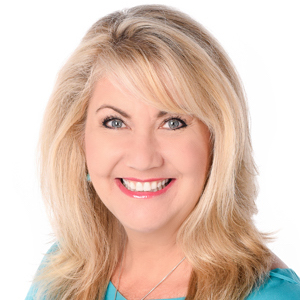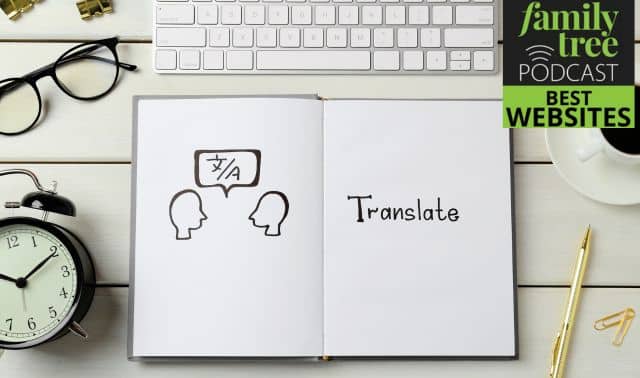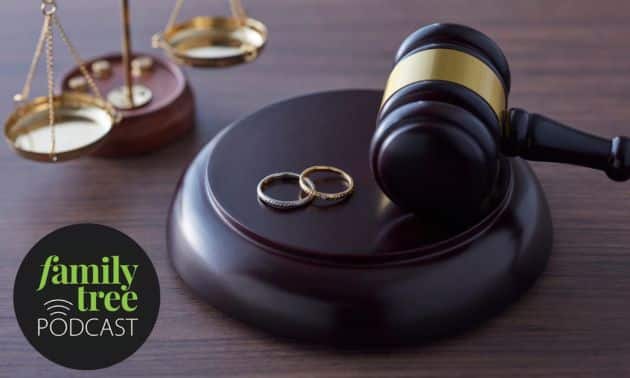Sign up for the Family Tree Newsletter! Plus, you’ll receive our 10 Essential Genealogy Research Forms PDF as a special thank you.
Get Your Free Genealogy Forms
"*" indicates required fields

Add these genealogy problem-solving tricks and strategies to your research arsenal with this February 2019 podcast.
Ep. 129: February 2019
In this episode:
This Month in Family History with Andrew Koch
After six months of fighting, the Japanese finally surrendered the island of Guadalcanal, one of the Solomon Islands, on Feb. 9. The Allied victory marked a turning point in the Pacific campaign of World War II. Along with the Battle of Midway in June 1942, the Battle of Guadalcanal set the Japanese on their back heels and hindered their further expansion. For the rest of the war, Japan was on the defensive.
Life on the island during the battle had been bleak. Allied soldiers struggled in the hot and humid climate, and tropical diseases such as malaria sidelined as many as two-thirds of Allied divisions at a time. Regular Japanese bombardment kept Allied troops from feeling truly secure in the drawn-out campaign.
How to find the records
You can request World War Two service records (called Official Military Personnel Files) from the National Archives. A 1973 fire at a records center in St. Louis destroyed 75 to 80 percent of Army and Air Force personnel records. However, you can still find World War II army enlistment records online at the National Archives’ Access to Archival Databases.
Sources:
Genealogy Problem-solving with Cluster Genealogy
Deborah A. Abbott, Ph.D. joins Lisa to discuss a powerful problem-solving reearch technique called Cluster Research.
Cluster research is the practice of searching beyond your ancestor. By researching the friends, neighbors, and associates of your ancestor, you may uncover new leads and new connections that can solve brick walls.
Deborah Abbott, PhD is a professional genealogist, specializing in genealogical methodology, manuscript collections and African American family research. A Trustee on the Board of the Ohio Genealogical Society (OGS), she is also a member of the Cuyahoga County Ohio Archives Advisory Commission, and of the Board of Directors for the Federation of Genealogy Societies (FGS). Moreover, Dr. Abbott is an affiliate with the Kentucky-Tennessee Associates, past president of the African American Genealogical Society, Cleveland, Ohio and a retired professor of Counseling from Cuyahoga Community College in Cleveland. She holds both the BS and M.Ed. degrees from Tuskegee University in Alabama and the PhD degree from Kent State University in Ohio.
Want to see Dr. Abbott put cluster research in action? Join the 2019 Spring Virtual Conference, where you’ll get access to a brand-new presentation from Dr. Abbott, along with 15 other videos, live Q&As, and activities galore to help you with your problem-solving.
DNA Deconstructed
Family Tree University instructor Shannon Combs-Bennett guides you through a particularly vexing DNA problem.
What to do when your match doesn’t have a tree? This can be a huge stumbling block for many researchers, but it doesn’t have to be. Just because they do not have a tree on the DNA site you are looking at, doesn’t mean they do not have a tree uploaded somewhere else. This will take a bit of detective work on your part, but your efforts may be rewarded.
There are several ways to do this. First, you want to look online at other DNA testing sites and online tree sites for the matches name. Their name may be a user name, which many people use consistently between platforms or a variation of their real name. Often a simple Google search will do the trick.
Check the shared matches for trees
Next, check to see if they share DNA with another match which does have a tree. Because so many DNA companies offer ways to see who else you and a specific person share DNA with, you may be able to find where they fit in through a shared match. Shared matches, in-common with, and other tools can help you determine how you are related to someone. If they share DNA with you and someone else (or a group of someones) you now know you can start with the genealogy research. This is especially true when the matches share surnames, or even better, the same familial lines.
Then, when all else fails, ask! Sometimes matches without trees are administered by someone else. Maybe they have not linked the DNA to a tree yet, or the person does not know how. Sometimes a simple email can fix the situation. Do not give up though if you do not hear back from someone right away. Sometimes it takes days, months, or even years. All sorts of reasons can prevent someone from writing back to you.
Best Genealogy Websites
Gena Philibert-Ortega joins us to talk about using newspaper research in our genealogy problem-solving.
Another way to solve genealogical problems is to find sources that can fill in the gaps in your ancestor’s history. Family history writer, author and Family Tree University instructor Gena Philibert-Ortega returns to the show to discuss one of her favorite genealogy websites that can do just that: GenealogyBank.com.
Gena’s Tips:
- Create a search plan
- Write down all of the versions of a person’s name
- Include and exclude words as you search
- Sometimes it helps to specify the state and newspaper
- Use the map of the U.S. on the home page to see which newspapers are available and from what time periods.
- GenealogyBank now includes the ability to save your search and save items to a folder.
- You can download articles to PDF or JPG
Stories from the Stacks
Toni Carrier, Director of The International African-American Museum Center for Family History, and Robin Foster Coordinator of Genealogy Education at the museum, join Lisa on the show. They provide an overview of the types of records you will find there on the website in their “Digital Library” and you can donate items from your own collection.
The International African American Museum is slated to open in Charleston, SC in 2020.
This Just In
Andrew Koch discusses the newly updated book,Family Tree Problem Solver, 3rd Edition.
Your Host: Lisa Louise Cooke
Listen to Lisa Louise Cooke’s Genealogy Gems and Genealogy: Family History Made Easy podcasts in iTunes and visit her website for great research ideas, podcast episodes and videos.
Have fun climbing your family tree!





